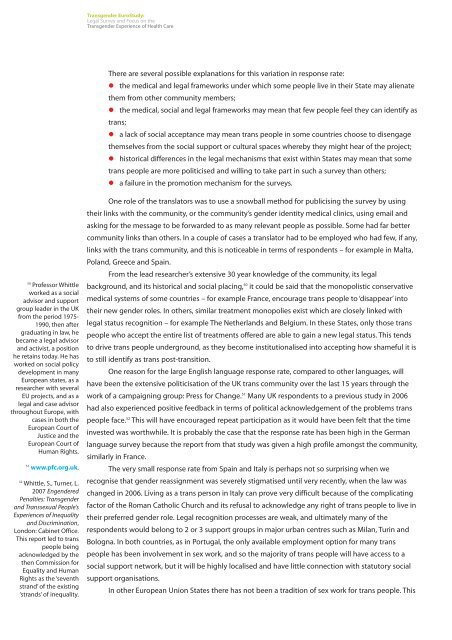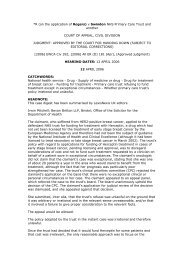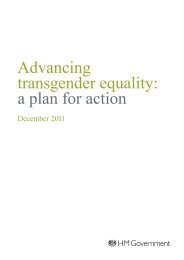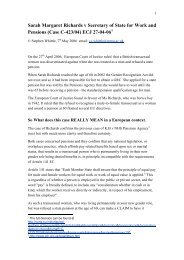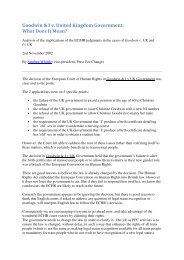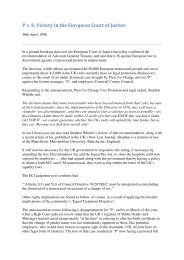Transgender EuroStudy â Legal Survey and Focus ... - ILGA Europe
Transgender EuroStudy â Legal Survey and Focus ... - ILGA Europe
Transgender EuroStudy â Legal Survey and Focus ... - ILGA Europe
Create successful ePaper yourself
Turn your PDF publications into a flip-book with our unique Google optimized e-Paper software.
<strong>Transgender</strong> <strong>EuroStudy</strong>:<br />
<strong>Legal</strong> <strong>Survey</strong> <strong>and</strong> <strong>Focus</strong> on the<br />
<strong>Transgender</strong> Experience of Health Care<br />
There are several possible explanations for this variation in response rate:<br />
the medical <strong>and</strong> legal frameworks under which some people live in their State may alienate<br />
them from other community members;<br />
the medical, social <strong>and</strong> legal frameworks may mean that few people feel they can identify as<br />
trans;<br />
a lack of social acceptance may mean trans people in some countries choose to disengage<br />
themselves from the social support or cultural spaces whereby they might hear of the project;<br />
historical differences in the legal mechanisms that exist within States may mean that some<br />
trans people are more politicised <strong>and</strong> willing to take part in such a survey than others;<br />
a failure in the promotion mechanism for the surveys.<br />
50<br />
Professor Whittle<br />
worked as a social<br />
advisor <strong>and</strong> support<br />
group leader in the UK<br />
from the period 1975-<br />
1990, then after<br />
graduating in law, he<br />
became a legal advisor<br />
<strong>and</strong> activist, a position<br />
he retains today. He has<br />
worked on social policy<br />
development in many<br />
<strong>Europe</strong>an states, as a<br />
researcher with several<br />
EU projects, <strong>and</strong> as a<br />
legal <strong>and</strong> case advisor<br />
throughout <strong>Europe</strong>, with<br />
cases in both the<br />
<strong>Europe</strong>an Court of<br />
Justice <strong>and</strong> the<br />
<strong>Europe</strong>an Court of<br />
Human Rights.<br />
51<br />
www.pfc.org.uk.<br />
52<br />
Whittle, S., Turner, L.<br />
2007 Engendered<br />
Penalties: <strong>Transgender</strong><br />
<strong>and</strong> Transsexual People’s<br />
Experiences of Inequality<br />
<strong>and</strong> Discrimination,<br />
London: Cabinet Office.<br />
This report led to trans<br />
people being<br />
acknowledged by the<br />
then Commission for<br />
Equality <strong>and</strong> Human<br />
Rights as the ‘seventh<br />
str<strong>and</strong>’ of the existing<br />
‘str<strong>and</strong>s’ of inequality.<br />
One role of the translators was to use a snowball method for publicising the survey by using<br />
their links with the community, or the community’s gender identity medical clinics, using email <strong>and</strong><br />
asking for the message to be forwarded to as many relevant people as possible. Some had far better<br />
community links than others. In a couple of cases a translator had to be employed who had few, if any,<br />
links with the trans community, <strong>and</strong> this is noticeable in terms of respondents – for example in Malta,<br />
Pol<strong>and</strong>, Greece <strong>and</strong> Spain.<br />
From the lead researcher’s extensive 30 year knowledge of the community, its legal<br />
background, <strong>and</strong> its historical <strong>and</strong> social placing, 50 it could be said that the monopolistic conservative<br />
medical systems of some countries – for example France, encourage trans people to ‘disappear’ into<br />
their new gender roles. In others, similar treatment monopolies exist which are closely linked with<br />
legal status recognition – for example The Netherl<strong>and</strong>s <strong>and</strong> Belgium. In these States, only those trans<br />
people who accept the entire list of treatments offered are able to gain a new legal status. This tends<br />
to drive trans people underground, as they become institutionalised into accepting how shameful it is<br />
to still identify as trans post-transition.<br />
One reason for the large English language response rate, compared to other languages, will<br />
have been the extensive politicisation of the UK trans community over the last 15 years through the<br />
work of a campaigning group: Press for Change. 51 Many UK respondents to a previous study in 2006<br />
had also experienced positive feedback in terms of political acknowledgement of the problems trans<br />
people face. 52 This will have encouraged repeat participation as it would have been felt that the time<br />
invested was worthwhile. It is probably the case that the response rate has been high in the German<br />
language survey because the report from that study was given a high profile amongst the community,<br />
similarly in France.<br />
The very small response rate from Spain <strong>and</strong> Italy is perhaps not so surprising when we<br />
recognise that gender reassignment was severely stigmatised until very recently, when the law was<br />
changed in 2006. Living as a trans person in Italy can prove very difficult because of the complicating<br />
factor of the Roman Catholic Church <strong>and</strong> its refusal to acknowledge any right of trans people to live in<br />
their preferred gender role. <strong>Legal</strong> recognition processes are weak, <strong>and</strong> ultimately many of the<br />
respondents would belong to 2 or 3 support groups in major urban centres such as Milan, Turin <strong>and</strong><br />
Bologna. In both countries, as in Portugal, the only available employment option for many trans<br />
people has been involvement in sex work, <strong>and</strong> so the majority of trans people will have access to a<br />
social support network, but it will be highly localised <strong>and</strong> have little connection with statutory social<br />
support organisations.<br />
In other <strong>Europe</strong>an Union States there has not been a tradition of sex work for trans people. This


